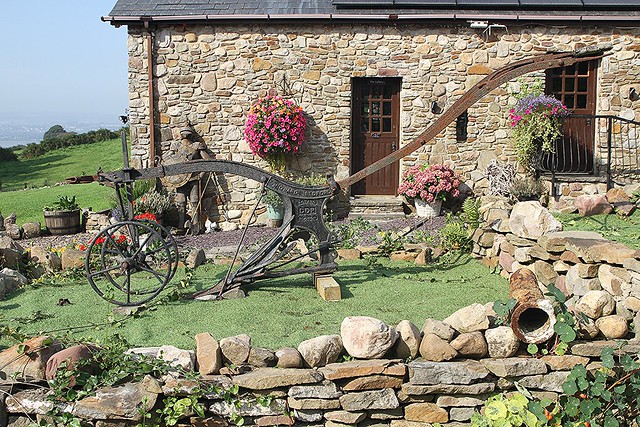Words for glue and related things in Celtic languages.
Words marked with a * are reconstructions.
| Proto-Celtic | *gloidos = glue, lime |
|---|---|
| Old Irish (Goídelc) | gláed [ˈɡlaːi̯ð] = glue |
| Middle Irish (Gaoidhealg) | gláed, glaed, glaedh, glaod = glue, birdlime gláedamail = glutinous, viscous gláedid = to adhere, hold fast gláeta = stuck, glued |
| Irish (Gaeilge) | glae = glue, gluey, sticky, substance, slime glaeigh = to glue glaeúil = gluey, slimy |
| Scottish Gaelic (Gàidhlig) | glaodh [gl̪ˠɯː] = comb, cud, honeycomb glaodhach [gl̪ˠɯː.əx] = gluey, pasty, (act of) gluing glaodhadh [gl̪ˠɯː.əɣ] = (act of) gluing, (act of) pasting glaodhte [gl̪ˠɯːdʲə] = glued, pasted |
| Manx (Gaelg) | gleiy = glue, adhesive, gum, jelly, mucilage gleihagh = jelly, jellylike gleighaghey = to (turn to, make) jelly |
| Proto-Brythonic | *glʉd = glue (?) |
| Middle Welsh (Kymraec) | glut, glud, glvd = glue, gum, birdlime glud, glut = sticky, adhesive, glutinous, viscious, tenacious glvdio, gludio = to glue, glum, paste, solder, fasten securely, cling, adhere, stick |
| Welsh (Cymraeg) | glud [ɡlɨːd / ɡliːd] = glue, gum, birdlime, paste, mess, gluten glud [ɡlɨːd / ɡliːd] = sticky, adhesive, glutinous, viscious, tenacious, constant, diligent, stubborn glud(i)aidd = sticky, viscid, gluey, clammy gludedd = tenacity gludiad = a gluing together, agglutination, cohesion, glutinousness glud(i)o = to glue, glum, paste, solder, fasten securely, cling, adhere, stick glud(i)og = gluey, glutinous, gummy, viscous, sticky, clammy glutgaul, glutgawl = jelly llud = slime |
| Old Cornish | glut = glue |
| Middle Cornish (Cernewec) | glut = glue, viscous matter, paste |
| Cornish (Kernewek) | glus = glue, adhesive, gum, resin glusa = to glue glusek, glujek = adhesive, sticky |
| Middle Breton (Brezonec) | glut = glue gludaff = to glue |
| Breton (Brezhoneg) | glud = glue gludañ = to glue gludegezh = viscosity gludek = sticky, viscous gludenn = sticky matter, glue gludennerezh = viscosity |
Etymology: from Proto-Indo-European *gleyH- (to smear, to stick, glue, putty) [source].
Words from the same PIE roots include gluten, glue, clay and cloth in English, kline (to smear) in Norwegian, hlína (earth, soil, clay) in Czech, liiv (sand) in Estonian, Klei (clay) in German [source].
| Proto-Celtic | *glinati = to adhere |
|---|---|
| Old Irish (Goídelc) | glenaid [ˈɡʲlʲe.nəðʲ] = to stick (to), cling, adhere |
| Middle Irish (Gaoidhealg) | gláedid = to adhere, hold fast, stuck, glued |
| Irish (Gaeilge) | glean = to stick, adhere, agglutinate |
| Proto-Brythonic | *glɨnad = to stick (?) |
| Middle Welsh (Kymraec) | glynu = to adhere, cleave, cling, stick, keep close, bind firmly |
| Welsh (Cymraeg) | glynu [ˈɡlənɨ̞ / ˈɡləni] = to adhere, cleave, cling, stick, keep close, bind firmly glynedig = stuck, sticking, sticky, adhesive, attached, connected glyniad = adhesion, adherence, attachment glynllyd = sticky glynol = clinging, adherent, tenacious, sticky, adhesive, infectious |
| Middle Cornish (Cernewec) | gleny, glyné = to cling to, cleave to, adhere, stick |
| Cornish (Kernewek) | glena (orth) = to adhere (to), stick (to) glenus = adhesive glenysen = sticker |
| Middle Breton (Brezonec) | *glenaff = to stick englenaff = to stick |
Etymology: from Proto-Indo-European *gli-né-H-ti, from *gleyH- (to smear, to stick, glue, putty) [source].
| Middle Irish (Gaoidhealg) | gliú = glue, adhesive stuff |
|---|---|
| Irish (Gaeilge) | gliú [ɟlʲuː] = glue gliúáil = to glue gliúch = gluey |
| Scottish Gaelic (Gàidhlig) | gluimh |
| Manx (Gaelg) | glooie = glue, adhesive, slime |
| Welsh (Cymraeg) | gliw = glue gliwaidd = gluey, sticky gliwio = to glue |
Etymology: from English glue, or from Middle English glew [ɡliu̯] (glue, birdlime, tar, resin), from Old French glu (glue, birdlime), from Late Latin glūs, from Latin glūten (glue), from Proto-Italic *gloiten, from Proto-Indo-European *glóh₁ytn̥, from *gleyH- (to smear, to stick, glue, putty) [source].
Sources: Wiktionary, Etymological Dictionary Of Proto Celtic, In Dúil Bélrai English – Old Irish glossary, eDIL – Electronic Dictionary of the Irish Language, Teanglann.ie, Am Faclair Beag, An etymological dictionary of the Gaelic language, Fockleyreen: Manx – English Dictionary, Online Manx Dictionary, Gaelg Corpus, Geiriadur Prifysgol Cymru, Lexicon cornu-britannicum : a dictionary of the ancient Celtic language of Cornwall, Gerlyver Kernewek, Devri : Le dictionaire diachronique du breton, Geriafurch, TermOfis



